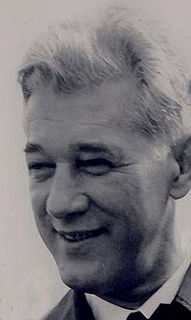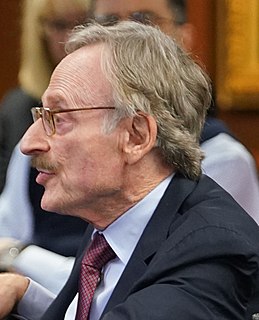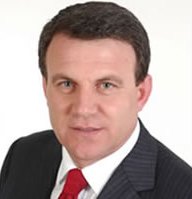Related Research Articles

Sir Charles Richard Bean is a British economist and was Deputy Governor for Monetary Policy at the Bank of England from 1 July 2008 until 30 June 2014. From 2000 to 2008, he served as Chief Economist at the Bank.

Corneliu Mănescu was a Romanian diplomat born in Ploiești. He served as Minister of Foreign Affairs of Romania from 1961 to 1972 and as President of the United Nations General Assembly from 19 September 1967 to 23 September 1968.
János Kornai, until 1945 János Kornhauser, is a Hungarian economist noted for his analysis and criticism of the command economies of Eastern European communist states.

Friedbert Pflüger is a former German politician of the Christian Democratic Union (CDU). He was a Member of the German Bundestag (1990-2006). He was Secretary of State in the Federal Ministry of Defence (2005–2006), and the CDU's candidate for Governing Mayor of Berlin in the 2006 Berlin state election. He was a member of the Berlin House of Representatives (2006–2011) and a member of the executive board of the CDU (2000-2010). Today, he is a businessman and teaches Energy- and Climate Security at the Center for Advanced Security, Strategic and Integration Studies (CASSIS), University of Bonn. He is Visiting Professor at King’s College London.

Michael Jay Boskin is the T. M. Friedman Professor of Economics and senior Fellow at Stanford University's Hoover Institution. He also is Chief Executive Officer and President of Boskin & Co., an economic consulting company.

Willem Hendrik Buiter CBE is an American-British economist. He spent most of his career as an academic, teaching at various universities. More recently, he was Chief Economist at Citigroup.
Marina von Neumann Whitman is an American economist, writer and former automobile executive. She is a Professor of Business Administration and Public Policy at the University of Michigan's Ross School of Business as well as The Gerald R. Ford School of Public Policy.

The Hungarian People's Republic was a one-party socialist republic from 20 August 1949 to 23 October 1989. It was governed by the Hungarian Socialist Workers' Party, which was under the influence of the Soviet Union. Pursuant to the 1944 Moscow Conference, Winston Churchill and Joseph Stalin had agreed that after the war Hungary was to be included in the Soviet sphere of influence. The HPR remained in existence until 1989, when opposition forces brought the end of communism in Hungary.
Goulash Communism, also commonly called Kadarism or the Hungarian Thaw, refers to the variety of communism in Hungary following the Hungarian Revolution of 1956. János Kádár and the Hungarian People's Republic imposed policies with the goal to create high-quality living standards for the people of Hungary coupled with economic reforms. These reforms fostered a sense of well-being and relative cultural freedom in Hungary with the reputation of being "the happiest barracks" of the Eastern Bloc during the 1960s to the 1970s. With elements of regulated market economics as well as an improved human rights record, it represented a quiet reform and deviation from the Stalinist principles applied to Hungary in the previous decade.
Sir Timothy John Besley, is a British academic economist who is the School Professor of Economics and Political Science and Sir W. Arthur Lewis Professor of Development Economics at the London School of Economics (LSE).
Alexandru Athanasiu is a Romanian politician and jurist. A former leader of the Romanian Social Democratic Party (PSDR), he is a member of the Social Democratic Party (PSD) since 2001. Athanasiu served as Prime Minister on an interim basis from 13 December to 22 December 1999, heading the Romanian Democratic Convention (CDR) cabinet after the resignation of Radu Vasile. On 1 January 2007, with the accession of Romania to the European Union, Athanasiu became a Member of the European Parliament for the PSD.

Anne Osborn Krueger is an American economist. She was the World Bank Chief Economist from 1982 to 1986, and the first deputy managing director of the International Monetary Fund (IMF) from 2001 to 2006. She is currently the senior research professor of international economics at the Johns Hopkins School of Advanced International Studies in Washington, D.C. She also is a senior fellow of Center for International Development and the Herald L. and Caroline Ritch Emeritus Professor of Sciences and Humanities' Economics Department at Stanford University.

George Pratt Shultz is an American economist, politician, and businessman. He served in various positions under three different Republican presidents and is one of only two people to have held four different Cabinet posts. Shultz played a major role in shaping the foreign policy of the Ronald Reagan administration. From 1974 to 1982, he was an executive of Bechtel Group, an engineering and services company. In the 2010s, Shultz was a prominent figure in the scandal of the biotech firm Theranos, continuing to support it as a board member in the face of mounting evidence of fraud.

Werner Hoyer is a German politician of the liberal Free Democratic Party of Germany (FDP), currently serving as the President of the European Investment Bank.

Louka Katseli is a Greek economist and politician. Today, she is Professor Emeritus of the National and Kapodistrian University of Athens, Chair of the National Bank of Greece in Cyprus, Vice President of the African Capacity Building Foundation (ACBF), Co-chair of the Independent Commission for Sustainable Equality, Progressive Alliance of Socialists and Democrats - S&D, and business consultant for enterprises and organizations in Greece and Europe.

Arben Malaj has been Minister of Finance and Economy in the Republic of Albania different times from 1997 until 2005. He is known for transforming the Albanian economy into a European profile, after the hard social-economic crisis that this country passed during the year 1997. He served as a Member of the Albanian Parliament from 1997 to 2013 chairing the Parliamentary Committee on Economy and Finance.
Henry Jacob Aaron (b.1936) is an American policy analyst and economist. He is the Bruce and Virginia MacLaury Senior Fellow in the Economic Studies Program at the Brookings Institution, where he has been employed since 1968. He served as director of the program from 1990 through 1996.

János Horváth was a Hungarian economist and politician, member of the National Assembly (MP) from 1998 to 2014. He fled to the United States after the failure of the Hungarian revolution of 1956 becoming a college professor and, later, a candidate for the United States House of Representatives.
Harald Bernard Malmgren, scholar, ambassador, international negotiator, senior aide to US Presidents John F. Kennedy, Lyndon B. Johnson, Richard Nixon, and Gerald Ford, and to US Senators Abraham A. Ribicoff and Russell B. Long, United States Senate Committee on Finance, advisor to many foreign leaders and CEOs of financial institutions and corporate businesses, and frequent author of articles and papers on global economic, political, and security affairs.

Cosmin-Ștefan Marinescu is a Romanian economist and professor of economics at the Bucharest Academy of Economic Studies. On 22 December 2014, he was appointed Presidential Advisor on Economic and Social Policy to the President of Romania. Previously, he served as Advisor to the Romanian Minister of Economy, Trade and Business Environment (2012), and the Advisor to the Romanian Minister of Public Finance (2013). He is also the founder of the Centre for Economics and Liberty - ECOL, a Romanian non-profit educational and research initiative aiming to promote the principles of democracy and economic freedom.
References
- Janos, Andrew C. (2000). East Central Europe in the Modern World: The Politics of the Borderlands from Pre- to Postcommunism. Stanford, California: Stanford University Press.